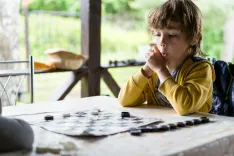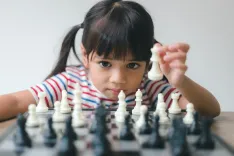Strategy Games for Kids: Ideas and Tips for Child Development

Contents
Games are not only a way to have fun but also a powerful tool for development. Strategy games for kids are not just entertainment but a foundation for forming key skills that will be useful in the future. Such entertainment, like chess or checkers, teaches children to plan their actions, anticipate opponent moves, and make thoughtful decisions. They develop logic, critical thinking, and problem-solving ability, which is an important skill in the modern world.
In this article, we'll examine why strategy games are so important, which ones suit specific ages, and what needs to be considered when opening a whole world of logical adventures to your child. If you're looking for safe and educational games that develop strategic thinking, Keiki is an excellent solution for your child.
The Benefits of Strategy Games for Your Child's Brain Development
Even simple strategy games bring many benefits for children. They improve logical thinking, develop planning skills, and teach problem-solving. These games bring enormous benefits for comprehensive brain development in such aspects:
- Development of logical thinking and deduction. In strategy games, children need to analyze situations, find hidden patterns, and draw conclusions. This trains their ability for logical thinking, which is the foundation for studying mathematics, science, and programming.
- Improvement of planning and forecasting skills. To win, you need to plan actions several steps ahead and anticipate possible opponent moves. This way children will think ahead and understand that each of their actions has consequences.
- Development of critical thinking. Tasks can also be called problem-solving games for kids, as there's no single correct answer. Children learn to analyze different options, weigh pros and cons, and choose the most optimal solution. This helps them develop critical thinking ability.
- Improvement of concentration and attention. Strategy games require full immersion and focus. Children learn to concentrate on one task and not get distracted by extraneous things, and this skill is essential in school.
- Strengthening problem-solving skills. Each game is a new puzzle to solve. Children learn to find ways out of difficult situations and not give up even when something doesn't work out.
Choosing Strategy Games by Age – Important Stage for Parents
To start teaching strategy to kids, you first need to properly understand the workload the child is ready for. This takes into account their age, interests, and even developmental characteristics. But age is still the main marker for parents.
Simple Strategy Games for Toddlers and Preschoolers (3-4 years)
The main rule for toddlers and even for strategy games for preschoolers is clarity and accessibility without unnecessary complexity. Your goal is to give basics, create interest, not permanently discourage the desire to think logically.
Tic-Tac-Toe
There are many logic games for kids, but this one enjoys unchanging popularity from generation to generation. It teaches children to think ahead and anticipate opponent moves. The game requires nothing but a sheet of paper and pencil.
Block Tower
Children take turns placing blocks on top of each other. The goal is to build the tallest tower without dropping it. This game teaches planning and being careful.
Rock, Paper, Scissors
This is a simple but effective game that teaches children to make choices and understand that each decision has consequences.
Puzzles and Jigsaw Puzzles
Puzzles require children to plan and be attentive to connect parts into a whole. There are also many online puzzle games that work similarly and have no limitations on the number of possible pictures.
Board and Card Strategy Games for Older Children (5-6 years)
Strategy games for kindergarten are already a more serious challenge. They simultaneously prepare for school, train attentiveness and logic, concentration and creativity, but don't lack excitement and fun.
Checkers
Checkers is an excellent game for developing logic and planning. It teaches children to think several steps ahead and see different development scenarios. Chess or Go, for example, as strategy games for 5 year olds don't suit everyone, but checkers are an excellent compromise.
Battleship
This game requires logic and deduction from children to find opponent ships. It also develops spatial thinking.
Monopoly (Children's Version)
If you're looking for board games for kids, there's no better option than Monopoly with simplified rules. The children's version of this game teaches economics basics, counting, and planning.
Card Games
Fool, Memory, and many other entertainments help pass evenings. They develop memory, logic, and ability to anticipate opponent moves.
Strategy Games with Minimal Equipment
We all need no-equipment strategy games, we all keep looking for the simplest options so we don't suffer from long cleanup or preparation later. And such simple tasks really exist, requiring minimal things at hand.
Hot and Cold
One player hides an object while others must find it. The first player gives clues: "hot" (if close) or "cold" (if far). This game develops logic and deduction.
I Spy
One player thinks of an object while others must guess it by asking questions. This game develops observation skills, logic, and ability to ask the right questions.
Captain-Strategist
One player becomes captain and gives instructions to other players on how to move around the room. The goal is to reach treasure without bumping into each other. This game teaches planning and teamwork.
How to Choose Your Child's First Strategy Game?
Choosing the right game is key to making your child love strategy games and not get disappointed. Approach searching for easy logic games for kids creatively, experiment. The following tips will also help:
- Consider age and interests. Start with simple games that match the child's age and favorite themes. For example, if they love dinosaurs, choose a game related to them.
- Duration and complexity. Choose games that won't take too much time so the child doesn't get tired. Start with tasks where rules are simple and clear.
- Reviews and recommendations. Study other parents' reviews and expert recommendations. This will help you find a game that will be interesting and useful specifically for your child.
- Even if you find an interesting option, change it from time to time. It's better to combine several types of activities and games so they don't bore the child.
Digital Strategy Games: Variety for Development
Educational apps for kids usually offer many tasks for strategic thinking, logic, memory, and attention. Keiki is no exception. This is an engaging and interactive way to develop logic and critical thinking. They can complement traditional games and motivate children to learn. The app offers such online strategy games for kids:
- Puzzles. Of course, we can't do without them. Simple, bright, interactive, not requiring purchase, and guaranteed that no element will be lost.
- Tetris Party. A bright and dynamic game, nevertheless directly related to strategic and spatial thinking. The child needs to think about how to properly arrange all elements so they assemble into a square.
- Continue the Series. Such tasks can be attributed to comprehensive child brain development games because they simultaneously train strategic approach, logic, memory, and attentiveness.
Digital strategy games are an excellent way to train logic as they offer endless options, bright visual effects, and sound accompaniment. Even time with a tablet or smartphone can be spent beneficially. Such games often include difficulty levels, allowing adaptation for the child's age and skills. Keiki offers safe and educational games for developing strategic thinking.
Strategy games for kids are not just a way to entertain children but an opportunity to create a solid foundation for their intellectual development. From simple puzzles to complex board games – every game contributes to developing logic, critical thinking, and problem-solving ability.
FAQ
Good strategy games for kids include "Checkers," "Tic-tac-toe," "Battleship," and "Monopoly" (children's version). They develop logic, planning, and decision-making ability.
Yes, strategy games improve brain function. They train working memory, concentration, attention, and problem-solving ability.
Yes, many strategy games don't require much inventory. For example, "Tic-tac-toe" can be drawn on any surface, and "Rock, paper, scissors" requires nothing.


